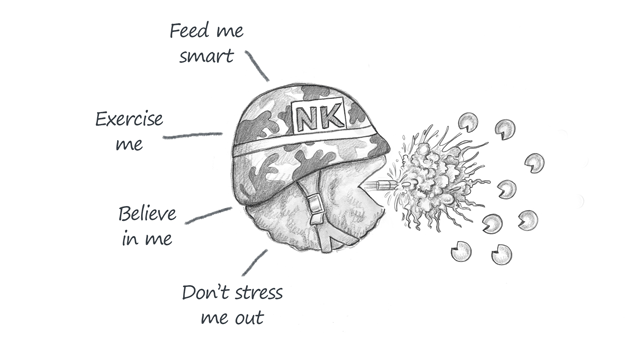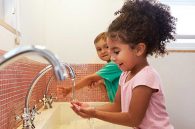Coronavirus Insights
We all are feeling overloaded with information regarding the coronavirus, some credible and some not so credible, from a multimedia overload. The good news is that the coronavirus, thus far, seems to be at lowest risk in infants and young children. Seniors over the age of 60, especially those with chronic medical conditions, are most at risk. The following are the tips that we give our patients in the Sears Family Pediatric Practice:
Tips to Stay Healthy
1. Don’t worry – and take wise precautions
Excessive worry and prolonged, unresolved stress weaken your natural immune system, just the opposite of what you want to do when protecting your body against a communicable disease, and any illness for that matter. While the coronavirus is a potentially serious threat, you do have control over how you preload your body to protect against this virus.
2. Preload to protect
One of the top illness-preventing concepts we teach our certified health coaches at the Dr. Sears Wellness Institute is what we call “pre-loading” – doing whatever you can always to keep your immune system healthy. When your immune system is preloaded it is as if it is saying to you: “Okay, you have fed and cared for us wisely, so we are armed to fight for you against any germ that may come your way.” A simple way that we teach pre-loading in our medical practice, even to children as young as seven, is by teaching them about their natural germ-fighting army inside. I show them pictures of their natural killer (NK) cells, a Pacman-looking cell with a helmet that says “NK” on it. These trillions of NK cells are constantly on high alert and police your body with search-and-destroy missions for germs (and even cancer cells, by the way) that don’t belong in your body and may threaten its health. Like magnets, they attach themselves to the foreign germs and literally shoot biochemical bullets into them and blow them up. If the general of your NK army could tell you four things to help your army fight better it would be: 1) believe that we will fight for you; 2) feed us healthy foods, such as fruits, vegetables, and seafood; 3) avoid “added sugar” on food labels and curtail sweet treats, especially sugary beverages, which depresses the immune system; and 4) move more, sit less – or, as Dr. Mom wisely advised, “Go outside and play!” It’s interesting that studies have shown that movement mobilizes the immune system and increases the fighting ability of your NK cells. You will find diagrams and more information about pre-loading and caring for your immune system in our two latest books: The Dr. Sears T5 Wellness Plan and, our newest book, The Healthy Brain Book.

3. Avoid spreading germs with your hands
- No handshaking. A bow or fist-bump you see commonly during sports are safer affirmations.
- Because the coronavirus can live on surfaces for up to 1-2 weeks, it makes sense to refrain from touching the most common surfaces that the virus is likely to live on: light switches, doorknobs, toilet flushers, elevator buttons, handles and handrails, gasoline pumps, and other high-touched areas. If you don’t have a wipe, use your knuckles or two hands with knuckles to turn knobs.
- Wipe shopping cart handles with disinfectant wipes if they are available. If not, bring your own (see below for how to make your own hand sanitizer) or else use disposable gloves with this kind of highly touched public surface.
4. Cover your mouth
Rather than using your hand to cover your nose and mouth when you cough or sneeze, use a disposable napkin or, as a last resort, cough/sneeze into the inside of your elbow. Remember that coughing onto clothing can harbor the virus for a week or more, so be careful that others don’t touch your sleeve.
5. Wash your hands
Wash your hands thoroughly and often, using soap and water, for 20 seconds. Teach your kids to wash while they sing the Happy Birthday song two times.
6. Make your own hand sanitizer
Since commercial hand sanitizers are likely to be “out of stock” for a while, you can make your own with a combination of 91% rubbing alcohol and aloe vera gel. Here is a viable recipe we found online: Stir together well (I used a wire whisk) 2/3 cup 91% rubbing alcohol and 1/3 cup aloe vera gel. You can add 8-10 drops of essential oils (such as Tea Tree or Lavender for added benefit) to mask the odor of the alcohol. Pour this into several small bottles and keep one next to your home entrance door, in your car, at work, and any other areas where you’re likely to encounter the most people-touched objects, especially where soap and water is not handy.
7. Don’t touch your face
You may be surprised to learn that most of us habitually rub our eyes, nose and mouth nearly a hundred times a day, which can quickly transmit the virus from face to hand or from hand to face. As far as we know, the COVID-19 virus infects lungs as its main entry point, which brings us to the question of should you wear a mask. Since this virus is spread by droplets (tiny particles of mucus holding the virus) in the air from coughing or sneezing, you might think a mask should protect you from coughing the virus onto someone else and vice versa. Yet, most authorities do not believe that the typical masks sold in stores are that protective. The ones that are protective are so tightly fitting that it’s almost impossible to talk while wearing them. One good thing about wearing a mask, though, is it reminds you not to touch your nose, mouth, or eyes.
8. Follow trusted resources
Follow trusted coronavirus resources, such as found at the CDC website.
9. Preload your immune system with smart foods
These include fruits, vegetables, and seafood. Especially during flu season, our family preloads our bodies with an immune-boosting smoothie in the morning, and a veggie and seafood-rich dinner in the evening. We especially try to eat foods high in zinc, such as eggs, nuts, legumes, and shellfish.
Surviving Through the Coronavirus Scare
In a nutshell, the best ways to thrive and survive through the coronavirus scare is: preload your body; don’t worry, be happy; eat more fruits, vegetables and seafood; go outside and play; wash your hands; and keep coughing, sneezing, and touching to yourself.
Go here for information on the coronavirus.

